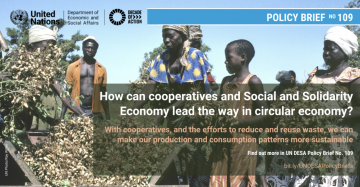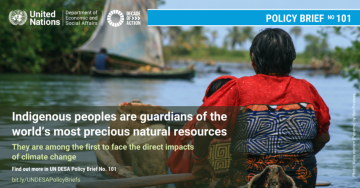Publications
Displaying 21 - 30 of 162
UN General Assembly Reports on Social Development |
UN General Assembly Reports on Social Development |
At its 3rd plenary meeting, on 16 September 2022, the General Assembly, on the recommendation of the General Committee, decided to include in the agenda of its seventy-seventh session the item entitled: “Rights of Indigenous Peoples: “(a) Rights of Indigenous Peoples; “(b) Follow-up to the outcome document of the high-level plenary meeting of the General Assembly known as the World Conference on Indigenous Peoples” and to allocate it to the Third Committee.
Publication |
The migration of persons represents one of the most important social phenomena of the late twentieth and early twenty-first centuries. Closely linked with migration is the rapid urbanization that is occurring in so many parts of the world. As migrants leave rural lifestyles seeking opportunities in cities, urban areas are growing at an exponential pace. Both trends have profound effects on family life, family relationships, and family practices. Policies and programs that support migration and well-planned and well-managed sustainable urbanization are closely related to the successful realization of the United Nations Agenda 2030 and the embedded Sustainable Development Goals (SDGs).…
UN General Assembly Reports on Social Development |
UN General Assembly Reports on Social Development |
UN General Assembly Reports on Social Development |
The present report, which is submitted pursuant to General Assembly resolution 75/153, contains information on the preparations for the observance of the thirtieth anniversary of the International Year of the Family in 2024 and an analysis of the impact of new technologies on families. The report is also focused on the potential of digital technologies to help to enable the achievement of work-family balance and on the role of such technologies in promoting and facilitating parenting education.
UN General Assembly Reports on Social Development |
Policy Briefs |
Introduction
In his report to the 59th Commission for Social Development on the priority theme of socially just transition towards sustainable development (E/CN.5/2021/3), the Secretary- General pointed out that “By adopting the 2030 Agenda, world leaders recognized that the current trajectory of economic development has not led to shared prosperity for all, but to high and rising inequalities in many countries, the climate crisis, and unsustainable consumption and production patterns. These consequences have taken a toll on social development and people’s well-being, especially among the most vulnerable.” The Report further analyzed the link between high inequality, consumerism…
Policy Briefs |
Threats to indigenous peoples’ livelihoods and traditional knowledge
Climate change is the greatest challenge facing humanity today. Its effects, however, are disproportionately distributed, in particular affecting vulnerable and socially marginalized population groups. Indigenous peoples are among the first to face the direct impacts of global warming on the ecosystems or landscapes they inhabit, owing also to their dependence upon, and close relationship with the environment and its resources. Examples of the negative impacts include diseases associated with increasing temperatures such as, vector-borne and water-borne diseases; drought and desertification leading to forest fires and the…
UN General Assembly Reports on Social Development |
The present report is submitted pursuant to General Assembly resolution 74/124. In the report, in view of the coronavirus disease (COVID-19) pandemic, the Secretary General addresses the impact of the crisis on families and elaborates on family oriented policies to mitigate its effects on households. He also focuses on parenting and parenting education as a tool to enhance children’s well-being and resilience in times of crisis and prevent violence against children. Lastly, he addresses the modalities for the preparations for the thirtieth anniversary of the International Year of the Family, in 2024.
 Welcome to the United Nations
Welcome to the United Nations


